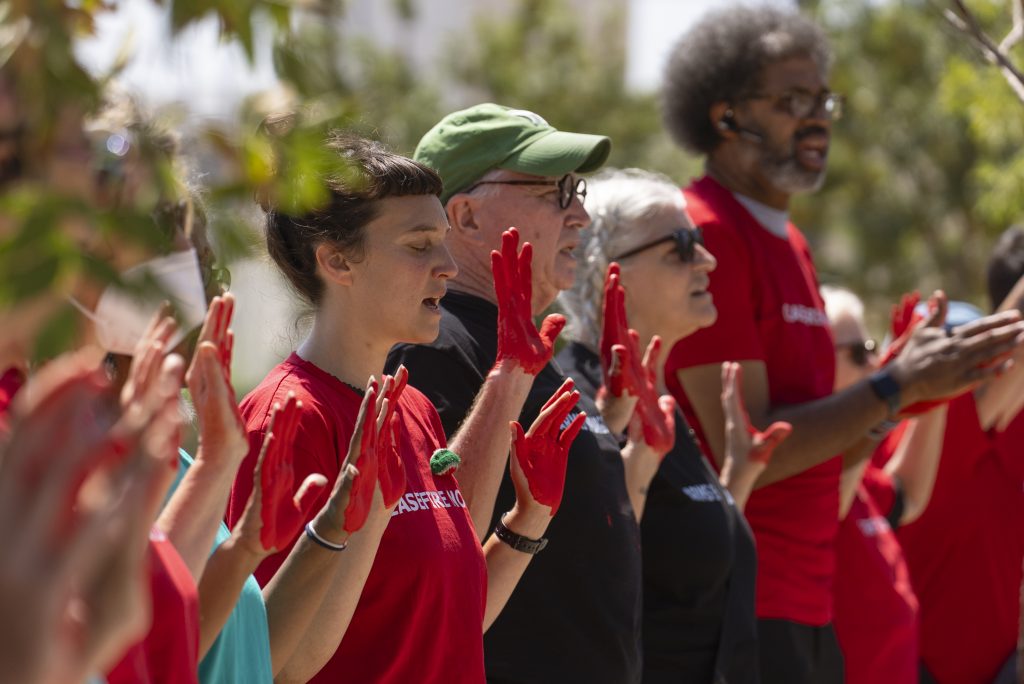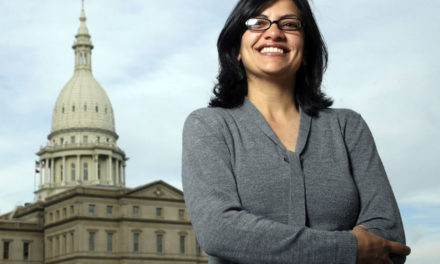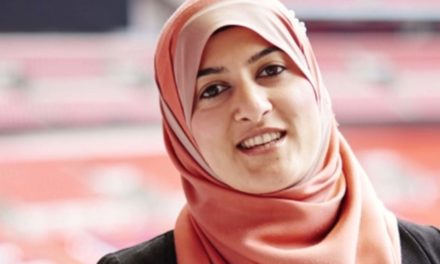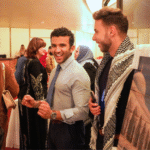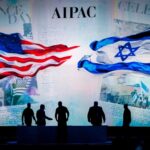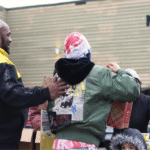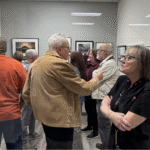U.S. Interfaith Journey for Justice delegates singing at the US Embassy (Photo: Will Allen-DuPraw)
Two dozen members of a U.S. interfaith peace delegation were lined up August 30 shoulder-to-shoulder in the noon-hour glare across the street from the U.S. embassy in Jerusalem. They were singing the Batya Levine protest song “We Rise” as they held up hands covered in fake blood. Meanwhile, inside the embassy, six other members of the delegation were meeting with an embassy liaison and asking for more U.S. pressure on Benjamin Netanyahu to end the war in Gaza and stop the growing settler violence and land theft in the West Bank.
Unconcerned, the embassy’s six security guards eyed the protestors from the shade of the entrance plaza. But as the singing and chanting continued, a supervisor in an all-black uniform walked across the street to talk with the leader of the peace delegation, Omar Haramy of Sabeel, a Christian liberation theology movement based in Palestine.
The U.S. Embassy, the man told Haramy, had just called the Israeli police. Embassy officials offered no explanation why police were needed to quell a peaceful protest by American citizens.
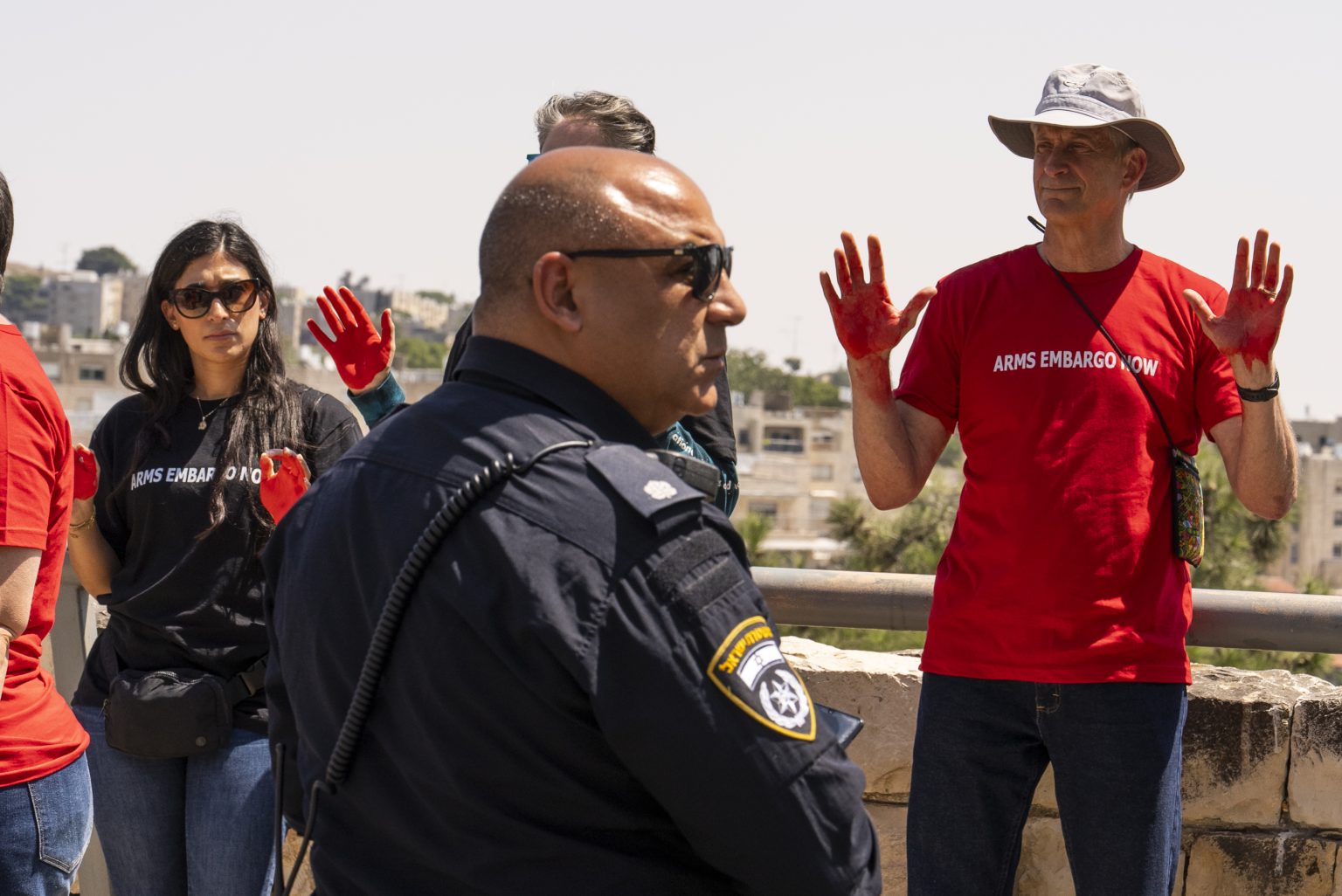
Security Supervisor at US Embassy confronts the delegates. (Photo: Will Allen-DuPraw)
During the short-lived embassy protest, delegates got a taste of the challenges to come when three Hasidic Jewish men walked by as though the singing protesters two feet away were invisible.
Zarni stepped in front of the trio, holding up his bloodied hands.
“Will you join us?” he asked.
“What is it?” the tallest of the three men asked.
“It’s to stop the genocide in Gaza.”
“So, this is going to stop it?” the man said. “Good luck with that.”
The three continued walking on as the protestors broke into “We Shall Overcome.”
Within minutes, two cruisers arrived at the scene and officers forced the delegation to move a block downhill from the embassy and wait there for the embassy visitors. The embassy liaison, of course, had promised to “pass on” to persons unknown the group’s concerns.
Out of sight, out of mind. But perhaps not for long.

The 30 members of the U.S. Interfaith Journey for Justice – rabbis, kohenets, ministers, nuns and community leaders as well as Buddhist and Hindu human rights activists – were on a 10-day visit to the West Bank (August 26-September 3) in a show of solidarity with Palestinian victims of Israeli apartheid, violence, and displacement.
Crisscrossing the occupied territories on bus and by foot, the group visited:
- Shufat Refugee camp near East Jerusalem where residents told the group that Israeli soldiers enter twice a day and throw tear gas at the community and sometimes shoot up houses and buildings at random. The UNRWA school building is pocked with bullet holes. The day after the group visited, August 27, Israeli soldiers raided the camp.
- The Al-Aqsa Mosque or Dome of the Rock, where Israeli police are allowing Jewish worship at the Muslim holy site despite a long-standing agreement prohibiting it. A small group of the team was given a tour of the mosque on August 28 and shown the broken interior windows and other Israeli military damages to the compound that Palestinians are forbidden to repair. A few days after the group’s visit, an extreme Jewish group entered the compound and performed their prayers near the Dome of the Rock.
- Mt. Zion, a property near the Old City of Jerusalem owned by the Greek Orthodox Church but subjected to ongoing harassment by a group of radical religious settlers backed by the Israeli government. The chapel built above an early Christian catacomb has been vandalized with paint and the locks of its door frequently broken. The school playground is regularly vandalized. Settlers violently disrupt Christian processions there and often spit on resident priests and young seminarians. Their animosity is fueled by unfounded Jewish claims to the lot as the burial site of King David. According to the World Council of Churches, Mt. Zion is one of many Christian properties targeted by Israeli radical groups who wish to drive the Christian presence from Jerusalem.
- Silwan, an historic Palestinian neighborhood located just south of Jerusalem’s Old City in occupied East Jerusalem where residents face demolitions, evictions, and settlement expansions by the Israeli government and settlers who hope to build a “City of David” theme park on top of the neighborhood. Israeli municipal authorities claim many Palestinians homes there were built without permits despite the fact that the municipality rarely issues building permits for Palestinians, regardless of reason.
- An educational and environmental farm owned by the Nassar family, a Palestinian Christian family, whose motto is “we refuse to be enemies.” The farm sits on the last remaining Palestinian hilltop in the illegal Gush Etzion settlement bloc near Bethlehem, and it remains under continual threat and attack from surrounding Israeli settlers and the army. The Nassar family holds a legitimate deed to the land but has been fighting in Israeli courts to be recognized as legal owners of the 100-acre farm for 33 years. In that time, the Nassars have faced 28 demolition orders, destruction of their olive trees and property, and an assault by 15 masked men in 2022 that hospitalized a family member.
- The family of Layan Nasir, 23, who was arrested on April 7 after 15 to 20 Israeli soldiers hammered on the door of her parents’ house in the West Bank town of Birzeit near Ramallah and removed her in the middle of the night. On April 15, Israeli intelligence placed Layan in administrative detention for four months without charges and have extended the detention for an additional 4 months.
- The Naba Al Ghazai village in the Jordan Valley, where villagers say they are harassed by a neighboring hilltop Jewish settlement. Teenagers from the settlement come in the night to waken and frighten children of the village. The settlers also graze their sheep on village land and, at times, run their mini-tractors through their flocks to scatter and frighten them, causing miscarriages among pregnant ewes. Village women say settlers pepper-sprayed them the day before the group arrived. An elderly family member was run over and killed while trying to protect their cars from settlers.
One of the delegates, Burmese exile and genocide expert Maung Zarni, framed the trip from a Buddhist perspective: “Once you know, you know. You can’t unknow it. And then you have to make a decision. Do you ignore the genocide and go on with your life? Or do you try to do something about it?”
The group members say they are determined to bring what they learned from their travels back home to their faith communities, their local media and congressional representatives, and their social media pages. The delegation was a partnership between Rabbis for Peace and Christians for Peace in the U.S. with guidance on the ground in Palestine from Sabeel. Since mid-August, Sabeel has led two faith delegations around the West Bank without incident. The Jerusalem-based organization hopes this is just the beginning.
“We want to encourage people to continue to bring groups here,” Haramy said. “No one is doing this but Sabeel. It is dangerous, but we can manage the safety for people. International presence is important. It empowers us on the ground and helps the Palestinian people escape the stereotypes (presented in the media). We want to create a flow of groups to Palestine.”
David Cooper, an emeritus rabbi in a progressive Oakland, Calif. synagogue, said he plans to reach out beyond his small community of Jews who already support the Palestinian cause. “We are not in a position to play any purist games. We should be prepared to say to Jews, ‘You can keep your Zionism, but I need you to come on (with us) as an ally against the oppression of the Palestinians.’”
John Wagner, a United Methodist minister and co-founder of the denomination’s national BDS movement, said it was important to engage the hierarchy of America’s organized Christian religions. “What I’d like to do is get bishops and leaders of denominations to go on one of these trips – those who more fully represent their religious communities.”
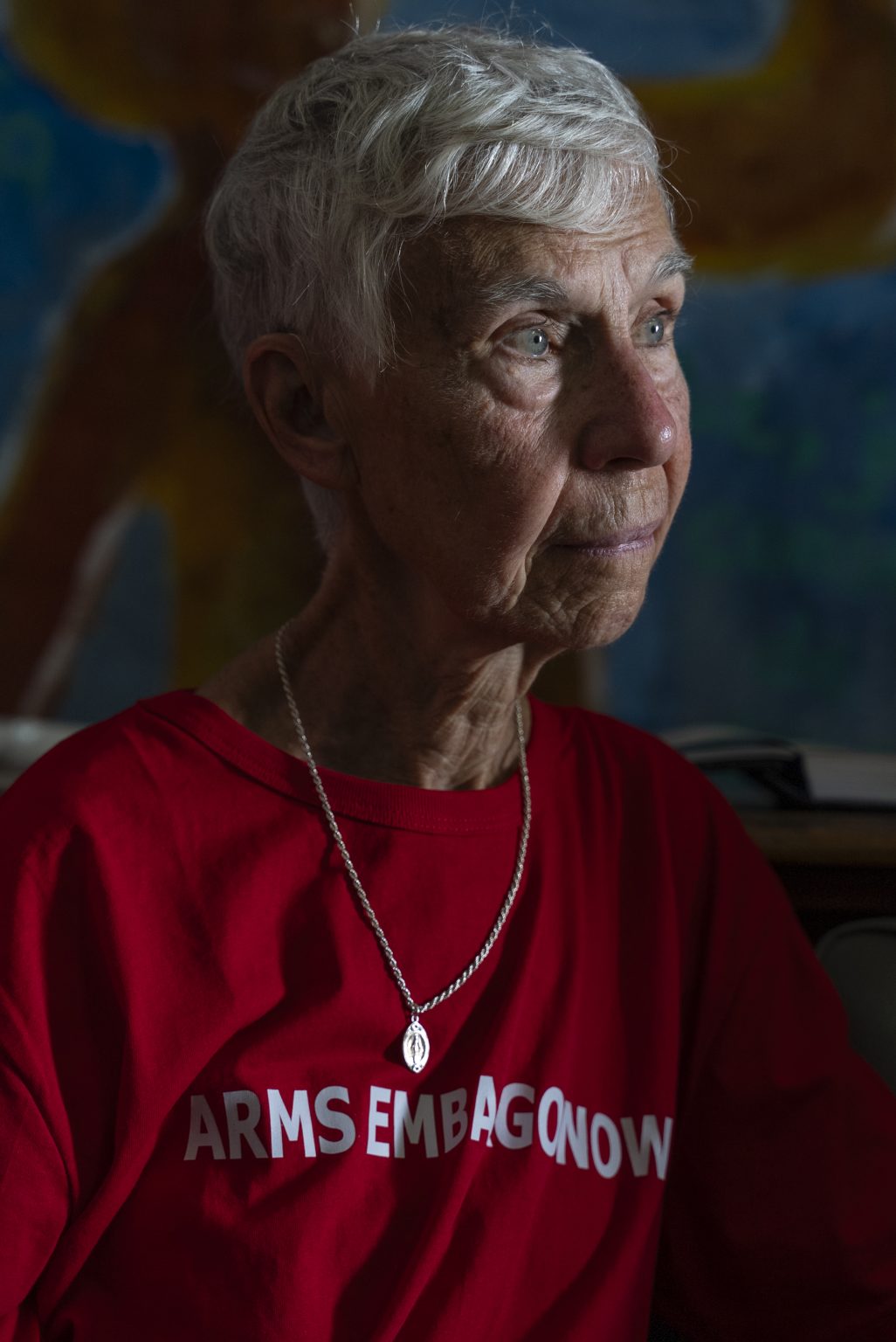
Sr. Diane Bardol (Photo: Will Allen-DuPraw)
For Sr. Diane Bardol, an 86-year-old social justice coordinator with the Grey Nuns of the Sacred Heart, her first trip to Palestine “had a visceral impact.” She’s planning separate presentations to her fellow sisters in Pennsylvania, New Jersey, and Maryland.
Darrell Hamilton, a Baptist minister in the Boston area, intends to spread the message from where he does it best – the pulpit. “I know my preaching won’t be the same. It wasn’t the same after I came the first time (to Palestine in early 2023), so I know it’s not gonna be the same after this.”
Hamilton said his Boston community is aware of the ongoing torture of Palestinian prisoners and the harassment and land confiscation by settlers. “But I want to better inform our advocacy and push that we do a much more professional job of bringing those stories to the forefront.”
Besides meeting with Palestinians, the delegation also heard from an array of human rights and relief organizations in Palestine about Israeli restrictions on their efforts. UNRWA, the largest relief organization in Palestine, lost its U.S. funding after Israel alleged that agency workers had been complicit in the October 7 Hamas assault. A UN investigation found nine UNRWA employees among 13,000 working in Gaza who may have been involved with Hamas. All nine were fired. The U.S. funds amounted to a quarter of UNRWA’s total budget.
“Carry the message home that it’s a complex picture before judging UNRWA,” Deputy Director of Affairs Roland Friedrich told the delegates. ”Before the war started, we saw the potential in Gaza. There were so many advancements and evidence-based hope of a better future, especially for the children of Gaza, that kept us going. Before then, we could manage (even with the Israeli blockade of Gaza). But this conflict is unprecedented as are the new (Israeli) restrictions on supplies coming in and new power limitations” on what the agency can do.
Hamilton said his hopes for the future of Palestine are anchored in the resiliency of the Palestinian people. “They are being systematically targeted and attacked. But they’re still burying their dead. People are still being married and having children. Homes are being demolished and homes are still being rebuilt. So you can see that the Kingdom of God is actually here (in Palestine), right now, in the present. (But) for that kingdom to actually flourish, it needs a ceasefire and an arms embargo.”
Delegate Sunita Viswanath, founder of Hindus for Human Rights, said she will draw on her own faith background in bringing home a message of radically inclusive and fearless resistance. She said she is inspired by the Buddhist philosophy that our own liberation is bound to the liberation of all and a Hindu tradition that teaches “God is in you and me identically, no matter who you are.”
She quoted Tania Nasir, godmother of Layan Nasir, the college student being held under detention, who told the group: “People like you, trying to feel, trying to help — our only hope is your anger. I pray your anger reaches your governments.”
Correction: A previous version of this article incorrectly stated that Um al-Kheir in Masafer Yatta was located near Nablus and the Jordan Valley. Um al-Kheir is located in the southern Hebron district of the West Bank.
Updated at 10:22 am EDT, September 23
